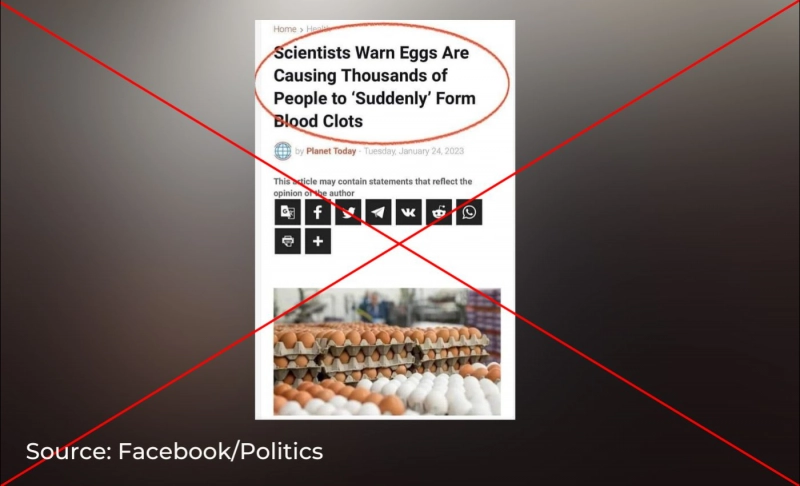By: Annet Preethi Furtado
February 2 2023
False: Scientists have warned that egg consumption is causing thousands of people to 'suddenly' form blood clots.

The Verdict False
The claim misrepresents a 2017 study conducted by the Cleveland Clinic. The research found no direct link between egg consumption and blood clots.
Context
In January 2023, posts were shared online with screenshots of a headline, apparently taken from NewsPunch, saying, "Scientists Warn Eggs Are Causing Thousands of People to 'Suddenly' Form Blood Clots." A Facebook user shared a similar screenshot of a Planet Today article, with a caption insinuating that clots could be a side effect of COVID-19 vaccines: "Eggs have been consumed by humans for millennia. I wonder what else could be causing this....". Several replies also supported this insinuation. The claim was promoted by an Ohio doctor, Dr. Sherri Tenpenny, and Joe Rogan, who has previously spread vaccine misinformation on his podcast.
The identically worded articles refer to a study conducted by Cleveland Clinic and claim that the study found that choline, an essential nutrient found in some food items like eggs, can increase the risk of blood clotting. NewsPunch also alleges that this discovery is being used to detract from alleged cardiac problems caused by COVID-19 vaccines. However, the claim is misleading.
In Fact
Both the Planet Today and NewsPunch articles claim in their headlines that eggs are causing blood clots. However, a Daily Express article, identical to and referenced in both the aforementioned articles, updated its January 22 report to state that the Cleveland Clinic study showed a "compound found in eggs" is linked to an elevated risk of blood clotting. The previous headline said: "Blood clots: The popular breakfast food that could enhance the risk of blood clotting," and mentioned "that a nutrient found in eggs and meat may also increase the risk of blood clotting," according to an archived link.
Logically reached out to the Cleveland Clinic for clarification on the study. In response, it stated the findings of the 2017 study – ''Gut Microbe-Generated Trimethylamine N-Oxide From Dietary Choline Is Prothrombotic in Subjects" – are not accurately represented in the articles. According to the study, taking additional choline in a capsule as a supplement increased Trimethylamine N-oxide (TMAO) levels and ''fostered increased platelet responsiveness, a risk factor for thrombotic events such as heart attack and stroke.'' The clinic stated the study failed to find a direct connection between eating eggs and suddenly developing blood clots. The clinic added that a more recent study in 2021 did not find a link either.
The NewsPunch article further makes unfounded claims that the study was an instance of the global elite conspiring to mislead the public over a rise in cardiac issues since COVID-19 vaccines were introduced. However, the Cleveland Clinic study was published in 2017, before the onset of COVID-19. NewsPunch is a known disseminator of misinformation and has been regularly fact-checked by Logically and other fact-checking organizations.
Further, the use of the word "suddenly" in the headline of the articles refers to the film "Died Suddenly," which spreads misinformation about the COVID-19 vaccine and has been debunked by many fact-checking organizations, including Logically. The phrase "suddenly" has also been adopted by many on social media to push similar anti-vaccine claims.
The Verdict
The claim that eggs are suddenly causing people to form blood clots is a misrepresentation of a Cleveland Clinic study, which discovered that taking choline supplements could make blood more prone to clotting. According to researchers, the headline does not accurately reflect the study's conclusions; therefore, we have marked this claim as false.


